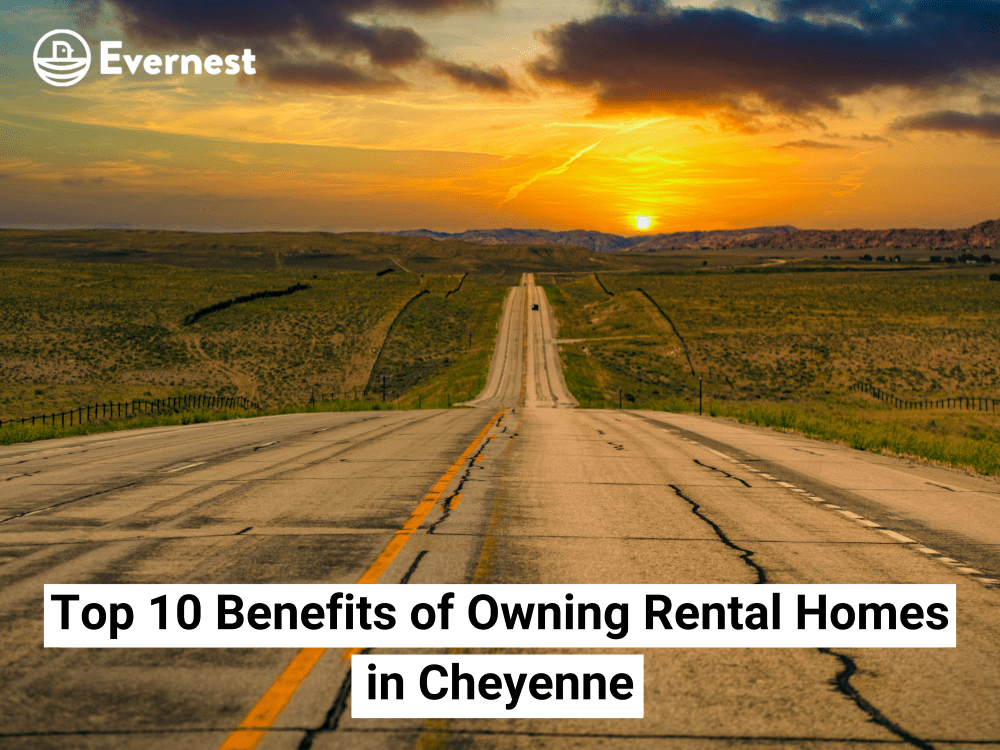For investors who are seeking to expand their portfolio, owning a rental property in Cheyenne,Wyoming is one great option to consider. After all, with a steady average rental rate, a growing population, and stunning geography, rental properties in Cheyenne come with many benefits. In this post, we’ll be walking through those benefits and the many reasons why you might consider Cheyenne as your next (or first) investment location.
Steady Income
Over the last couple of years, the rent prices in Cheyenne have remained consistent, while the median home price has slowly increased. This might signal that rent prices will remain stable amidst housing market fluctuations, which is an important feature for investors wanting to make passive income.
Tax Savings
Owning rental homes in Cheyenne, Wyoming can come with many tax benefits. If you’re unsure about what can apply to you, it’s best to consult a tax accountant. However, here are some deductions that you should be aware of:
Depreciation
Over time, your rental property will experience wear and tear. Equally over time, you will pour resources into the property to fix those issues. The IRS allows you to deduct these wear and tear costs through depreciation. The IRS rules for single-family rental properties is to depreciate them over a 27.5-year period while the property is active. While you can only depreciate the costs of wear and tear off of the property itself and not the land it’s built on, it can still potentially offer a significant break on your tax bill.
Operating Expenses
As a rental property owner, you are a business, which means you can deduct business expenses! Included in these write-offs are costs to operate and maintain your property. These generally include expenses such as:
- Property management
- Repair fees
- Landscaping
- Accountants
- Lawyers
- Supplies
- Advertising and Marketing
- Insurance
While, again, it’s best to consult a CPA, these are some potential deductions to keep in mind.
Travel Expenses
Another item that falls under business expenses is travel. Especially if you’re an out-of-state investor, this is a big one to be aware of. Travel expenses can include:
- Flights
- Hotels
- Meals
- Rental cars
- Gas mileage
If you qualify for these business deductions, they can put money back in your wallet.
Property Taxes and Mortgage Interest
Since rental properties are investments, owners can often deduct property taxes and mortgage interest as well. It’s recommended to consult with a CPA to find out exactly how these deductions can apply to your property, as there are rules and exceptions for both items.
Diversification
Another benefit to owning a rental property in Cheyenne is diversification. Whether you’re a first time investor or you have a portfolio of properties already, adding another market to that portfolio diversifies both your investments and passive income stream. In case something ever happens to one of your properties in a different market or another investment, you’ll have a range of passive income streams to fall back on.
Economic Growth in Cheyenne
The Wyoming Department of Administration & Information’s Economic Analysis Division reported that total employment increased 2% and personal income increased 5.3% in the fourth quarter of 2022 compared to 2021. The economy in Cheyenne covers a wide range of industries, including government, military, manufacturing, mining, agriculture, tourism, and transportation. Major employers include:
- F.E. Warren Air Force Base
- The State of Wyoming
- Cheyenne Regional Medical Center
- Laramie County School District
- Union Pacific Railroad
- Sierra Trading Post
- Qwest Corporation
- Frontier Refining Inc.
The median household income is $70,705 while the current unemployment rate is 3.9%. The population grew 0.3% in 2021, and again in 2022.
Geography
Wyoming is a beautiful state that features the Rocky Mountains, the Great Plains, and seven national parks including Yellowstone. There are many national parks in neighboring states that are driving distance from Cheyenne as well. While Cheyenne is the Capital City, it’s only 9 miles away from the Colorado border, meaning residents have access to many of the activities, parks, and sights there. It takes under an hour to drive to Fort Collins, CO, where visitors can access the Horsetooth Mountain Open Space, with 29 miles of trails, horsebackriding, Horsetooth falls, and the Larimer County Fair and Rodeo. Inside Cheyenne lies museums such as the Cheyenne Frontier Days Old Museum, historic monuments, ranches, rodeos, parks, and cowboy towns. It’s a town full of culture, history, and activities to take part in.
Affordable Prices
While Cheyenne is known as a smaller market in comparison to some other rental housing markets, the housing prices here are 10% lower than the national average. In combination with the steadily rising population and consistent rental rates, this could show that there’s a lower barrier to entry when compared to many other popular markets, and a potential for returns. For investors who have a smaller budget for their next property, Cheyenne is a market to keep in mind.
Final Thoughts
Owning a rental property can provide passive income, portfolio diversification, and the property itself serves as an asset that can increase in value over time. Cheyenne is a beautiful state with rich history, national monuments, and parks to explore. The housing prices are lower than the national average at present while also rising year over year. The rental rates have been stable over multiple years, and the population is steadily increasing. For both current and first-time investors, this market is one to consider. If you’d like to learn more about Cheyenne, we have a free market deep dive that goes into more detail. Access more information here.


